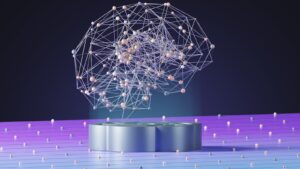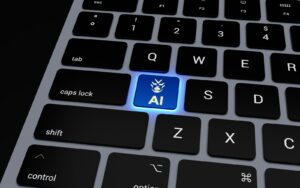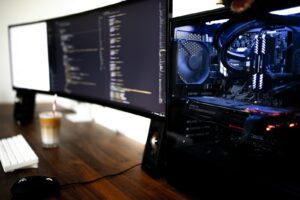The Transformative Impact of AI and Machine Learning on IoT
Revolutionizing Edge Data Processing
Enhancing IoT data processing with AI and machine learning is revolutionizing the landscape of modern technology. Edge computing, which processes data at the source rather than in a centralized cloud, significantly benefits from AI and machine learning. In bustling smart cities like Riyadh and Dubai, where real-time data processing is crucial, edge computing equipped with AI algorithms allows for immediate analysis and decision-making.
AI-driven edge computing enhances the efficiency of IoT systems by reducing latency and bandwidth usage. For instance, in Dubai’s smart transportation networks, AI algorithms analyze traffic data locally to optimize traffic flow and reduce congestion. This immediate processing enables quicker responses to changing traffic conditions, improving overall urban mobility.
Moreover, machine learning models at the edge can continuously learn and adapt to new data, enhancing predictive capabilities. In Riyadh’s smart healthcare systems, edge devices equipped with machine learning can monitor patient vitals in real-time, predict potential health issues, and alert healthcare providers promptly. This proactive approach improves patient outcomes and reduces the burden on central healthcare facilities.
Empowering Cloud Data Processing
While edge computing handles immediate data processing, the cloud plays a vital role in storing and analyzing large volumes of IoT data. AI and machine learning significantly enhance cloud data processing capabilities by providing powerful tools for data analysis, pattern recognition, and predictive analytics. In the UAE, where extensive IoT networks generate vast amounts of data, cloud-based AI solutions are essential for extracting actionable insights.
Machine learning algorithms in the cloud can process historical data to identify trends and anomalies, offering valuable insights for decision-making. For example, in Saudi Arabia’s smart energy grids, AI-powered cloud analytics can predict energy demand, optimize distribution, and detect potential faults in the grid. This ensures a stable and efficient energy supply, supporting the country’s growing urban infrastructure.
Additionally, the scalability of cloud platforms allows for the processing of data from numerous IoT devices simultaneously. In Dubai’s expansive IoT deployments across various sectors, cloud-based machine learning models can analyze data from smart buildings, transportation systems, and environmental sensors, providing a holistic view of the city’s operations. This integrated approach enhances the efficiency and effectiveness of smart city initiatives.
Integrating Edge and Cloud for Enhanced Capabilities
The integration of AI and machine learning in both edge and cloud computing creates a synergistic effect, enhancing the overall capabilities of IoT systems. This hybrid approach leverages the strengths of both paradigms, providing a balanced solution for efficient data processing and analysis. In Riyadh, where IoT applications span across diverse sectors such as healthcare, transportation, and energy, this integrated approach ensures robust performance and reliability.
At the edge, AI algorithms process data in real-time, providing immediate insights and responses. This data is then aggregated and sent to the cloud, where machine learning models perform deeper analysis and long-term trend identification. For instance, in the UAE’s smart agriculture projects, edge devices monitor soil conditions and crop health in real-time, while cloud-based AI analyzes this data to provide long-term farming insights and strategies.
This seamless integration also enhances data security and privacy. Sensitive data can be processed locally at the edge, reducing the risk of data breaches during transmission. In Dubai’s smart healthcare systems, this ensures that patient data remains secure while still benefiting from the advanced analytics capabilities of cloud-based AI.
Best Practices for Implementing AI and Machine Learning in IoT
Ensuring Data Quality and Consistency
For AI and machine learning models to provide accurate and reliable insights, the quality and consistency of IoT data are paramount. Organizations must implement robust data validation and cleansing processes to ensure that the data fed into AI algorithms is accurate and representative. In Saudi Arabia’s smart city projects, consistent and high-quality data is crucial for effective decision-making and operational efficiency.
Automated data validation tools can detect and correct errors in real-time, ensuring that only clean data is processed. For example, in Riyadh’s smart transportation networks, data from traffic sensors is validated to remove anomalies before being analyzed by AI algorithms. This ensures that the insights generated are reliable and actionable.
Moreover, standardizing data formats and protocols across all IoT devices enhances data consistency. In Dubai’s diverse IoT ecosystem, standardization ensures seamless integration and analysis of data from different sources, enabling more accurate and comprehensive insights.
Implementing Robust Security Measures
The integration of AI and machine learning in IoT systems also necessitates robust security measures to protect data integrity and prevent unauthorized access. Ensuring data security is particularly important in sensitive applications such as healthcare and critical infrastructure in the UAE and Saudi Arabia.
Encryption of data both in transit and at rest is essential to prevent data breaches and ensure privacy. In Dubai’s smart healthcare systems, encrypting patient data collected by IoT devices ensures that sensitive information remains secure. Additionally, implementing strong access controls and authentication mechanisms prevents unauthorized access to IoT devices and data.
Regular security audits and updates to AI and machine learning models are also crucial. These audits can identify potential vulnerabilities and ensure that security measures are up-to-date, protecting against emerging threats. In Riyadh’s smart energy grids, regular security audits ensure the reliability and security of AI-powered data analytics.
Leveraging Continuous Learning and Adaptation
One of the significant advantages of AI and machine learning is their ability to continuously learn and adapt to new data. This capability is particularly valuable in dynamic environments such as smart cities, where conditions change rapidly. In the UAE’s smart city initiatives, continuous learning ensures that AI models remain relevant and effective.
Implementing mechanisms for continuous learning involves regularly updating machine learning models with new data and retraining them to improve accuracy. For example, in Riyadh’s smart transportation systems, AI models are continuously updated with new traffic data to enhance their predictive capabilities. This ensures that the system can adapt to changing traffic patterns and provide accurate insights.
Additionally, feedback loops between edge and cloud computing enable continuous improvement. Data processed at the edge can be used to refine cloud-based AI models, while insights from the cloud can optimize edge computing algorithms. This iterative process enhances the overall performance and reliability of IoT systems in Saudi Arabia and Dubai.
Conclusion
The integration of AI and machine learning with edge and cloud computing significantly enhances the capabilities of IoT systems. By leveraging AI for real-time data processing at the edge and advanced analytics in the cloud, organizations can achieve more accurate, reliable, and actionable insights. Implementing best practices such as ensuring data quality, robust security measures, and continuous learning further enhances the effectiveness of these technologies. As Saudi Arabia, the UAE, Riyadh, and Dubai continue to expand their smart city initiatives, the adoption of AI and machine learning will play a critical role in driving innovation and efficiency across various sectors.
—
#IoT #AI #MachineLearning #EdgeComputing #CloudComputing #DataProcessing #SaudiArabia #UAE #Riyadh #Dubai #ArtificialIntelligence #Blockchain #TheMetaverse #ExecutiveCoaching #GenerativeAI #ModernTechnology #BusinessSuccess #LeadershipSkills #ProjectManagement













